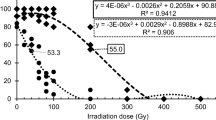Abstract
Embryogenie callus of indica rice (Oryza sativa L.) cv. Basmati 370 induced on MS medium containing 9.05 μM2,4-D was irradiated at 50 Gy of gamma rays of 60Co for creating genetic variability against salinity. Irradiated and non-irradiated calluses were screened in vitro through three consecutive proliferation phases at 4.0, 6.0, 8.0 and 10.0 d/Sm electrical conductivity of NaCl. Growth value and number of adapted mutagenized callus was more than that of non-mutagenized callus. Salinity levels beyond 6 d/Sm and 8 d/Sm were lethal to growth and adaptation of non-irradiated and irradiated callus respectively. NaCl adapted irradiated callus showed 2.0%–4.75% regeneration frequency on MS regeneration medium containing 5.37 MNAA and 9.29 μMKinetin. Non-mutagenized salt adapted callus did not show any regeneration. From gamma ray mutagenized cultures, 2 putative lines (M2 generation) with moderate salt tolerance were obtained at seedling stage. The results suggest that in vitro technique in connection with gamma rays may be used as a versatile approach to improve the level of salt tolerance in Basmati rice for saline environment.
Similar content being viewed by others
References
Ahloowalia, B. S., In vitro radiation induced mutagenesis in potato. In: The impact of biotechnology in agriculture. Sangwan RS, Sangwan Noreel BS (eds). Klumer Academic publisher, Dordrecht, Netherlands. 39–46, 1990
Ahloowalia, B. S., In vitro selection of mutants. In: Somaclonal variation and mutagenesis in plant improvement and in vitro selection of mutants. 15th IAEA/FAO Interregional Training Course on Advances in Technologies for induced mutation in crops. Siebersdorf, Vienna, Austria. 1–6, 1997
Ahloowalia, B. S., M. Malusznyski, and K. Nichterlin, Global impact of mutation derived varieties. Euphytica. 135: 187–204, 2004
Lia, B. S. and M. Malusznyski, Induced mutation — A new papdigm in Plant Breeding. Euphytica. 118: 167–173, 2001
Anonymous,Agricultural statistics of Pakistan. Government of Pakistan, Minsistry of Food, Agriculture and Livestock, Economic Wing, Islamabad, 2003
Basu, S., G. Gangopadhyay, S. Gupta, and B. B. Mukherjee, Screening for salt tolerance against related osmotic stress in adapted calli of salt sensitive and tolerant varieties of rice. Phytomorphology. 46(4): 357–364, 1996
Basu, S., G Gaurab, B. B. Mukherjee, and S. Gupta, Plant regeneration of salt adapted callus lines of indica rice (var. Basmati 370) in saline conditions. Plant Cell Rep. 50: 153–159, 1997
Bhagwat, B. and G.S. Duncan, Mutation breeding of hightage for tolerance to Fusarium oxysporum f.sp.cubense using gamma irradiation. Euphytica 101: 142–150, 1998
Cheema, A. A., M. Y. Saleem, and M. A. Awan, In vitro techniques for the selection of Basmati rice mutants better adapted to saline environments. In: Mutation, in vitro and Molecular Techniques for Environmentally Sustainable Crop Improvement. Mauszynski M and Kasha KJ (ed.) IAEA, Vienna. 161–168, 2002
Das, A., S. S. Gossal, J. S. Sindhu, and H. S. Dhaliwal, Induced mutations for heat tolerance in potato by using in vitro culture and radiation. Euphytica. 114: 205–209, 2000
Gregorio, G. B., Senadhira D, and R.D. Mendoza, Screening rice for salinity tolerance. In: IRRI discussion paper series no. 22. Int. Rice. Res.Inst, Manila, Phililippines. 1–29, 1997
Grover, A., D. Minhas, A. Grover, and D. Minhas, Towards production of abiotic stress tolerant transgenic rice plants: issues, progress and future research needs. In: Proc: Indian National Science Academy. Part B. Reviews and Tracts. Biological Sciences. 66(1): 13–32, 2000
Hasegawa, P. M., R. A. Bressan, J. K Zhu, and H. J. Bohnert, Plant cellular and molecular responses to high salinity. Annu. Rev Plant Physiol. Plant Mol. Biol. 51: 463–499, 2000
Lee, IS, D. S Kim, D. Y. Hyun, S. J. Lee, H. S Song, Y. P. Lim, and Y. I. Lee, Isolation of gamma-inuced rice mutants with increased tolerance to salt by anther culture. J. Plant Biotechnology. 5(1): 51–57, 2003
Melchers, G. and L. Bergman, Untersuchungen an Kulturen von haploiden Geweben von Antirrhinum majus. Ber. Dtsch. Bot. Ges., 78: 21–29, 1959
Pathirana, R., W.A. Wijithawanra, K. Jagoda, and A. L. Ranawaka, Selection of rice iron toxicity tolerance through irradiation caryopsis culture. Plant Cell Tissue and Organ Culture. 70: 83–90, 2002
Sathish, P., O.L. Gamborg, M. W. Nabors, Establishment of stable NaCl resistant rice plant lines from anther culture: distribution pattern of K+/Na+ in callus and plant cell. Theor. Appl. Genet, 95: 1203–1209, 1997
Stephen, R. G., L. Zeng, M. C. Shanon, and S. R Robert, Rice is more sensitive to salinity than previously thought, 2002, available at: http://darn.ucop.edu/calag
Yohsida, S., D. A. Forno, J. H. Cock, K. A. Gomes, Laboratory mannual for physiological studies of rice. Int. Rice. Res. Inst., Manila, Philippipnes: 54, 1976
Yokoi, S., A. B. Ray, and M. H. Paul, Salt tolerance of plants, P. 25–33, 2002. In: JIRCAS Working Report. Center for Environmental Stress Physiology, Purdue University, West Lafayette, USA.
Zhu, G. Y., J. M. Kinet, P. Bertin, J. Bouharmont, and S. Lutts, Crosses between cultivars and tissue culture-selected plants for salt resistance improvement in rice, Oryzasativa. Plant Breeding. 119(6): 497–504, 2000
Zhu, J. K, Plant salt tolerance. Trends in Plant Sci. 6: 66, 2001
Author information
Authors and Affiliations
Corresponding author
Rights and permissions
About this article
Cite this article
Saleem, M.Y., Mukhtar, Z., Cheema, A.A. et al. Induced mutation and in vitro techniques as a method to induce salt tolerance in Basmati rice (Oryza sauva L.). Int. J. Environ. Sci. Technol. 2, 141–145 (2005). https://doi.org/10.1007/BF03325868
Published:
Issue Date:
DOI: https://doi.org/10.1007/BF03325868




